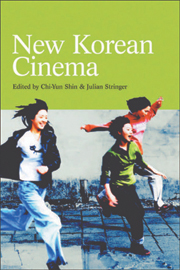Book contents
- Frontmatter
- Contents
- Notes on the Contributors
- List of Illustrations
- Introduction
- Part I Forging a New Cinema
- Part II Generic Transformations
- Part III Social Change and Civil Society
- 11 Peppermint Candy: The Will Not to Forget
- 12 The Awkward Traveller in Turning Gate
- 13 Memento Mori and Other Ghostly Sexualities
- 14 Interethnic Romance and Political Reconciliation in Asako in Ruby Shoes
- Glossary of Key Terms
- Bibliography of Works on Korean Cinema
- Websites
- Index
11 - Peppermint Candy: The Will Not to Forget
from Part III - Social Change and Civil Society
Published online by Cambridge University Press: 05 August 2013
- Frontmatter
- Contents
- Notes on the Contributors
- List of Illustrations
- Introduction
- Part I Forging a New Cinema
- Part II Generic Transformations
- Part III Social Change and Civil Society
- 11 Peppermint Candy: The Will Not to Forget
- 12 The Awkward Traveller in Turning Gate
- 13 Memento Mori and Other Ghostly Sexualities
- 14 Interethnic Romance and Political Reconciliation in Asako in Ruby Shoes
- Glossary of Key Terms
- Bibliography of Works on Korean Cinema
- Websites
- Index
Summary
The nation is a narcissistic entity for it celebrates rather than questions its past. Underlying this narcissistic sense of itself as a national self is the necessity not to remember certain aspects of its own history. This holds especially true when these historical moments would question the nation's ability to live up to its full national promise to those who constitute the nation as well as to retain its honourable status within the community of other nations. This double imperative – simultaneously to remember and not to remember – is a key factor in theorising the nation. In ‘Qu'est-ce qu'une nation?’ Ernest Renan stipulates:
L'essence d'une nation est que tous les individus aient beaucoup de choses en commun et aussi que tous aient oublié bien des choses … Tout citoyen français doit avoir oublié la Saint-Barthélemy, les massacres du Midi au XIIIe siècle.
(Renan, quoted in Anderson 1991: 199)[The essence of a nation is that all of the individuals have many things in common and also that they have already forgotten many things … All French citizens must have forgotten Saint Bartholomew and the Midi massacres of the thirteenth century.] (My translation)
In Imagined Communities, Benedict Anderson concurs with Renan by drawing attention to Renan's insistence on having ‘already forgotten what Renan's own words assumed that they [the French have] naturally remembered!’ (Anderson 1991: 200) Anderson does this by highlighting Renan's use of the ‘peremptory syntax of doit avoir oublié [have already forgotten] instead of doit oublier [must forget]’ (ibid.) when discussing the nation's darkest past history.
- Type
- Chapter
- Information
- New Korean Cinema , pp. 159 - 169Publisher: Edinburgh University PressPrint publication year: 2005



